
Lucas Sullivan
@lucasbsullivan.bsky.social
Associate Professor @ Fred Hutch
Studying metabolic constraints of cancer cell proliferation
https://research.fredhutch.org/sullivan/en.html
On a mote of dust suspended in a sunbeam
Studying metabolic constraints of cancer cell proliferation
https://research.fredhutch.org/sullivan/en.html
On a mote of dust suspended in a sunbeam
One new reviewer-initiated experiment: Unlike cancer cells, non-transformed cells grow poorly in serum free conditions. Highlights the fact that cancer cells are defined, in part, by the lack of requirement for exogenous growth factors. Makes fetal serum use for cancer cells all the more absurd!

October 13, 2025 at 9:06 PM
One new reviewer-initiated experiment: Unlike cancer cells, non-transformed cells grow poorly in serum free conditions. Highlights the fact that cancer cells are defined, in part, by the lack of requirement for exogenous growth factors. Makes fetal serum use for cancer cells all the more absurd!
SDH inhibition is distinct from other mitochondrial impairments due to the accumulation of succinate, which we hypothesized to play a role. First, we decreased succinate production by cotreating with the CI inhibitor rotenone. Result: restoration of pyrimidine synthesis, even with comparable ASP.
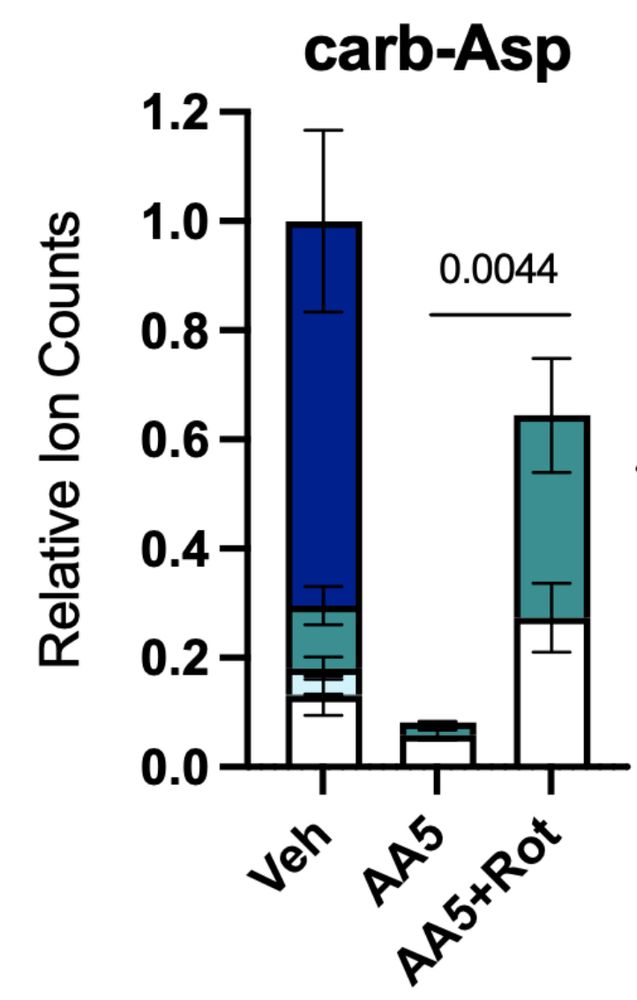
February 20, 2025 at 10:25 PM
SDH inhibition is distinct from other mitochondrial impairments due to the accumulation of succinate, which we hypothesized to play a role. First, we decreased succinate production by cotreating with the CI inhibitor rotenone. Result: restoration of pyrimidine synthesis, even with comparable ASP.
So, what happens if we restore pyrimidines to these cells?
A complete loss of the ASP rebound and a return to the (very reasonable) phenotype of monotonic ASP depletion.
So, SDH loss causes a disproportionate effect on pyrimidine synthesis by impairing ATCase, but why?
A complete loss of the ASP rebound and a return to the (very reasonable) phenotype of monotonic ASP depletion.
So, SDH loss causes a disproportionate effect on pyrimidine synthesis by impairing ATCase, but why?
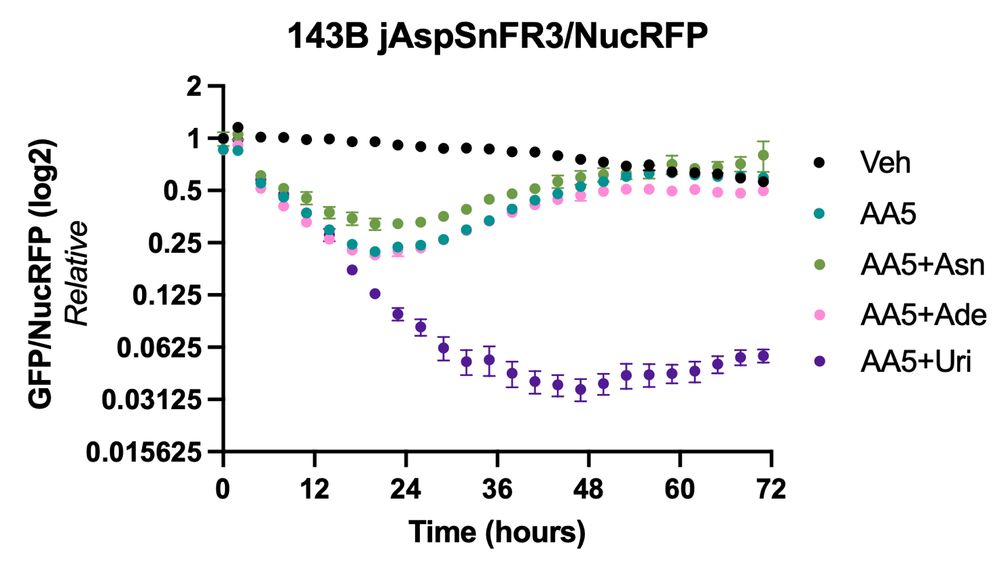
February 20, 2025 at 10:25 PM
So, what happens if we restore pyrimidines to these cells?
A complete loss of the ASP rebound and a return to the (very reasonable) phenotype of monotonic ASP depletion.
So, SDH loss causes a disproportionate effect on pyrimidine synthesis by impairing ATCase, but why?
A complete loss of the ASP rebound and a return to the (very reasonable) phenotype of monotonic ASP depletion.
So, SDH loss causes a disproportionate effect on pyrimidine synthesis by impairing ATCase, but why?
We next investigated the biosynthetic fates of aspartate and found:
Aspartyl tRNA charge = OK
Purine nucleotides = OK
ASN = OK - Rebounds with ASP
Pyrimidine nucleotides = Depleted at the first step (ATCase, which makes Carb-ASP) - and stays depleted even with rebounding ASP:
Aspartyl tRNA charge = OK
Purine nucleotides = OK
ASN = OK - Rebounds with ASP
Pyrimidine nucleotides = Depleted at the first step (ATCase, which makes Carb-ASP) - and stays depleted even with rebounding ASP:
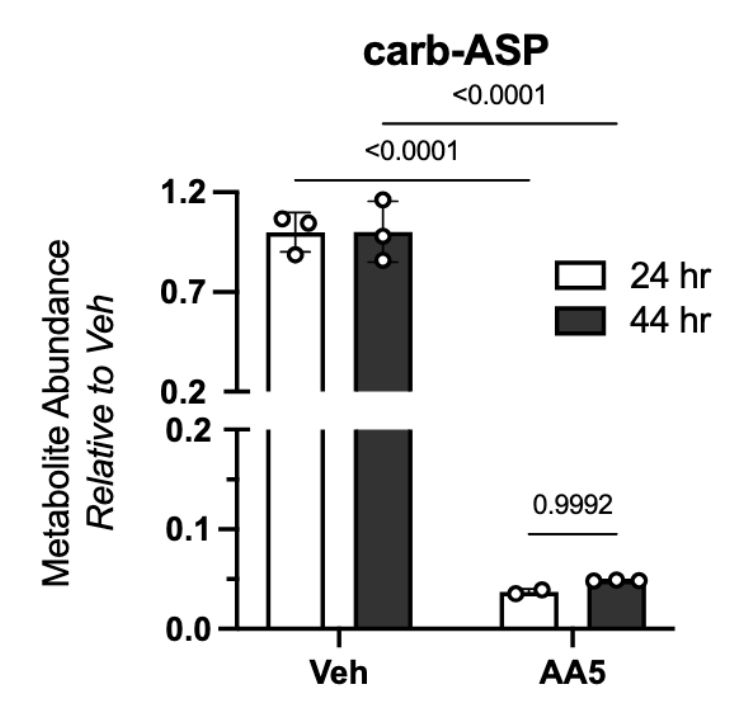
February 20, 2025 at 10:25 PM
We next investigated the biosynthetic fates of aspartate and found:
Aspartyl tRNA charge = OK
Purine nucleotides = OK
ASN = OK - Rebounds with ASP
Pyrimidine nucleotides = Depleted at the first step (ATCase, which makes Carb-ASP) - and stays depleted even with rebounding ASP:
Aspartyl tRNA charge = OK
Purine nucleotides = OK
ASN = OK - Rebounds with ASP
Pyrimidine nucleotides = Depleted at the first step (ATCase, which makes Carb-ASP) - and stays depleted even with rebounding ASP:
When we did the same experiment with the SDH inhibitor AA5, we get a strange result:
ASP declines for ~24 hours until proliferation slows, then..ASP rebounds???
Even stranger:
Proliferation doesn't recover with ASP even though we know ASP supplementation would solve the proliferation defect!
ASP declines for ~24 hours until proliferation slows, then..ASP rebounds???
Even stranger:
Proliferation doesn't recover with ASP even though we know ASP supplementation would solve the proliferation defect!
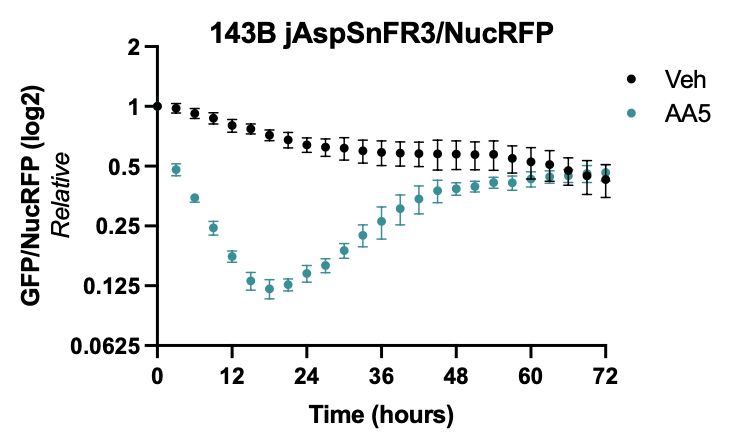
February 20, 2025 at 10:25 PM
When we did the same experiment with the SDH inhibitor AA5, we get a strange result:
ASP declines for ~24 hours until proliferation slows, then..ASP rebounds???
Even stranger:
Proliferation doesn't recover with ASP even though we know ASP supplementation would solve the proliferation defect!
ASP declines for ~24 hours until proliferation slows, then..ASP rebounds???
Even stranger:
Proliferation doesn't recover with ASP even though we know ASP supplementation would solve the proliferation defect!
Deploying our ASP biosensor, jAspSnFR3, Madeleine & co used live cell imaging to continuously measure ASP levels (GFP) and cell number. In two cases – CI inhibition and GOT1/2 DKO cells, ASP levels crash over 24 hours then cell proliferation decays, leading to a new ~steady state.
Very reasonable.
Very reasonable.
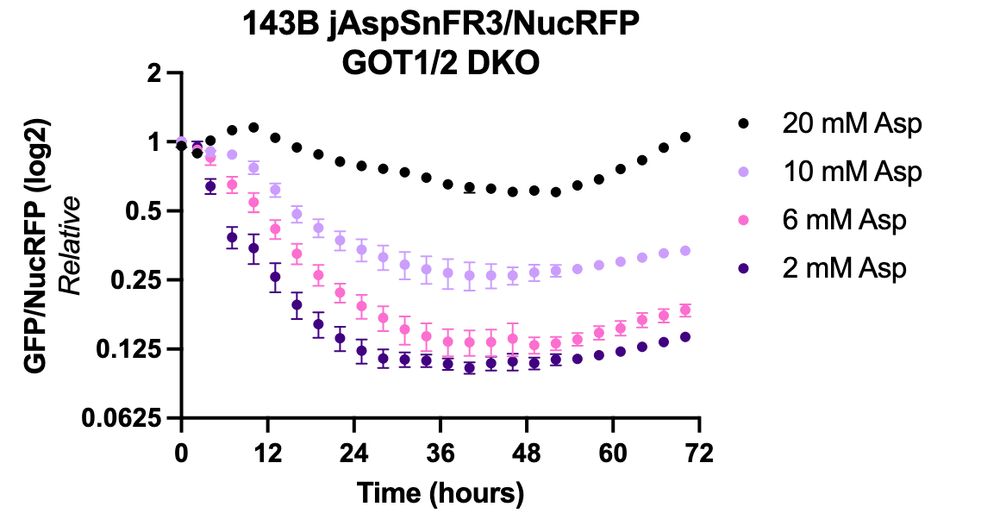
February 20, 2025 at 10:25 PM
Deploying our ASP biosensor, jAspSnFR3, Madeleine & co used live cell imaging to continuously measure ASP levels (GFP) and cell number. In two cases – CI inhibition and GOT1/2 DKO cells, ASP levels crash over 24 hours then cell proliferation decays, leading to a new ~steady state.
Very reasonable.
Very reasonable.
Quantitative lipidomics from media gave a clear answer – albumin-associated lipids (fatty acids, LPCs, LPEs). Importantly, supplementing cells with an ITS additive (containing missing metals) and any of these albumin-associated lipids equivalently supported serum-free cancer cell proliferation.
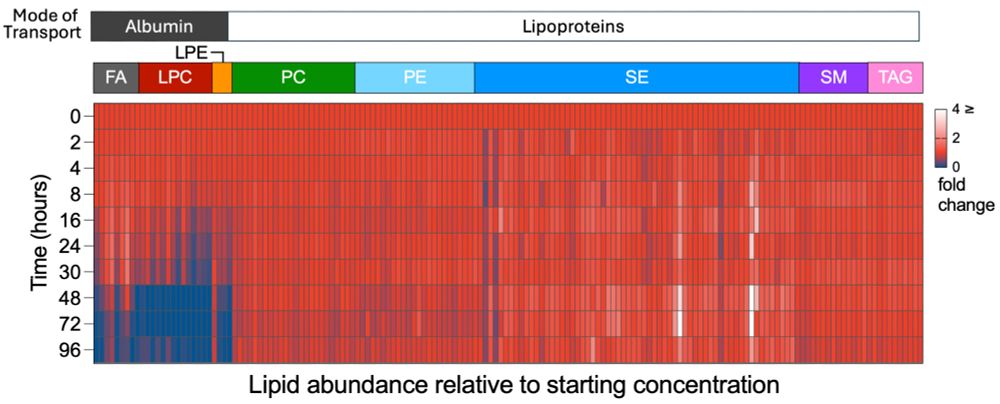
February 20, 2025 at 2:43 AM
Quantitative lipidomics from media gave a clear answer – albumin-associated lipids (fatty acids, LPCs, LPEs). Importantly, supplementing cells with an ITS additive (containing missing metals) and any of these albumin-associated lipids equivalently supported serum-free cancer cell proliferation.
Using live cell imaging of cancer cell proliferation in reduced serum conditions, Oliver found that cell proliferation doesn’t immediately slow, it decays over time, suggesting the consumption and depletion of essential nutrients.
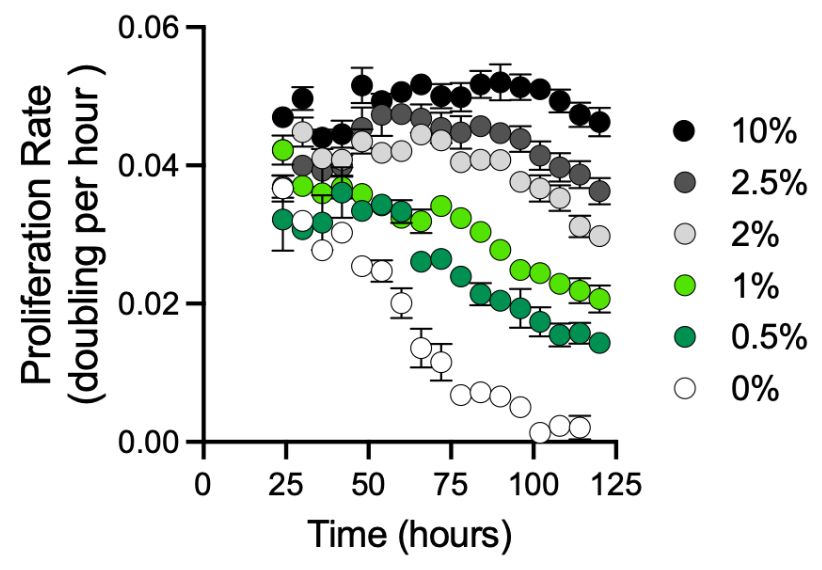
February 20, 2025 at 2:43 AM
Using live cell imaging of cancer cell proliferation in reduced serum conditions, Oliver found that cell proliferation doesn’t immediately slow, it decays over time, suggesting the consumption and depletion of essential nutrients.

